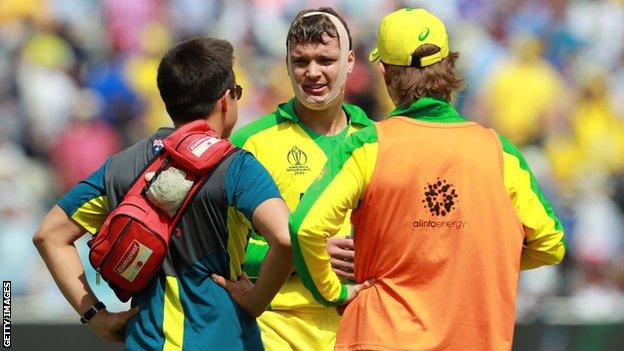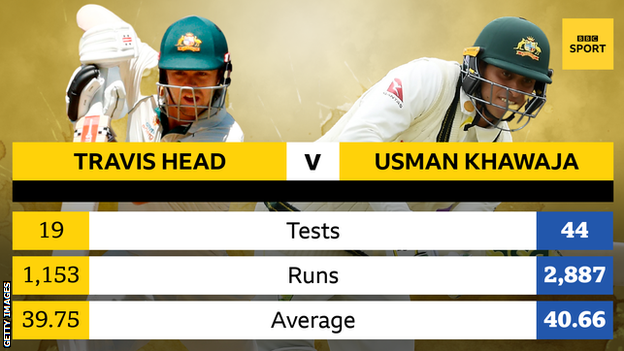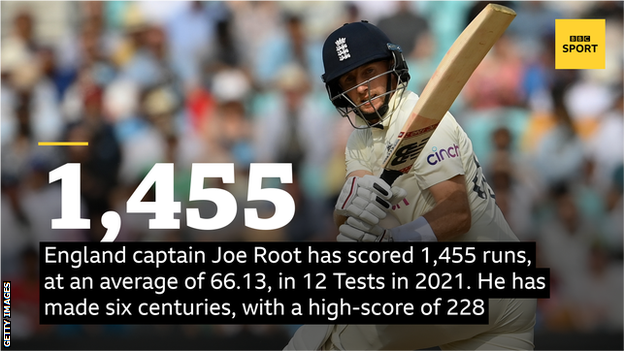Ashes: 'Joe Root, Steve Smith and David Warner's success with bat will decide series'
- Published

Alex Carey was hit in the jaw by a Jofra Archer bouncer during the 2019 50-over World Cup in England but batted on after being bandaged up
The Ashes: Australia v England, first Test |
|---|
Venue: Gabba, Brisbane Dates: 8-12 December Time: 00:00 GMT |
Coverage: Daily highlights show on BBC iPlayer, ball-by-ball commentary on Test Match Special, plus live text commentary, UK-only clips, features and analysis on the BBC Sport website and app |
After the ructions of losing a captain weeks before a headline tournament, Australia's Ashes squad has now settled back into shape.
Pat Cummins was the obvious successor to lead the team in place of the departed Tim Paine. Almost as inevitably, the final piece in the puzzle was appointing South Australian wicketkeeper Alex Carey to replace Paine with the gloves.
Carey did have to survive a late write-in campaign from prominent former players such as Ricky Ponting in support of Western Australia's Josh Inglis, external, who has had a prolific year or so across formats with the bat.
But Carey has been flagged as a leader and the next in line for at least three years, and he provides composure on the field that might soon be badly needed.
In the 2019 World Cup he showed what he was made of, with a string of excellent innings down the order that adapted to each situation.
His mettle was best shown when Jofra Archer hit him in the jaw with a short ball: Carey calmly caught his helmet before it could fall back onto his stumps, got bandaged up and kept batting.
Earlier this year Carey became Australia's 26th captain in one-day cricket as an injury replacement for Aaron Finch while touring the Caribbean, and handled the appointment with poise while leading a series win. He will now add Test cap 461 to his list of laurels.
The only outstanding questions before Australia named their XI on Sunday were relatively minor ones: which of Usman Khawaja or Travis Head would bat at five, and whether pace bower Jhye Richardson should supplant Mitchell Starc for the opening contest.
Left-hander Head and left-arm pace bowler Starc got the nod, with Cummins naming Australia's side at a pre-series media lunch.
Head is more flighty with his shot selection than Khawaja, but has a knack for making useful scores that form partnerships, even though he rarely goes large.
Had he been picked, Khawaja would have been playing in his fifth Ashes series, having never influenced one before.
In a decade of Tests against England he has averaged 29, with his one century coming in the final Australian innings of a 4-0 walkover.

Richardson has been a source of anticipation since an electric debut back in 2019 that also came at the Gabba. But he soon injured his shoulder and it has been a long road back.
Australian selections favour hierarchy, and they have opted to stick with the conservative approach of picking the same pace trio that dominated on England's last visit: Starc, Cummins and Josh Hazlewood.
But with Adelaide's day-night match starting three days after Brisbane, and with Starc being the preeminent operator with the pink ball, there had been a strong argument to release him fresh under lights.
Rarely will two teams have entered an Ashes series so underdone. Brisbane's rain has severely curtailed England's opportunities to acclimatise via outdoor training or matches.
Six of Australia's likely XI have had a run of first-class cricket, but the five biggest names were busy winning the T20 World Cup instead.
But then, as Steve Smith showed after his long suspension lay-off in 2019, perhaps match-play preparation is overrated. Or, it is if you're good enough. As has been the case since 2015, so much of Australia's batting will rely on the two pillars of Smith and David Warner.
The thing is, both enter the series as relative unknown quantities.
With Australia's string of cancelled tours, Smith has played four Tests in nearly two years.
Warner, who had an injury setback, has played two. These matches were a year ago, and during them neither player was at his dominant best.
Smith's meticulousness and ability to rise to occasions will give him a good chance of continuing his influence on Ashes contests.
Warner looked in trouble after being dropped from his Indian Premier League team, short of confidence and touch, but rebuilt through Australia's T20 World Cup campaign to be the most influential with the bat.
Home pitches are happy hunting grounds for Warner: 18 of his 24 Test hundreds have come in Australia, at an average of over 63.
For England, so much rests on whether Mark Wood can stay fit enough to change matches with pace when required, in the absence of any of England's other genuine quicks.
Should the match begin with Stuart Broad and James Anderson taking the new ball, no matter their thousand and more Test wickets, the Australians in home conditions will not be overly worried.

As for England's batting, the Australians will once more target Joe Root as they have done successfully in the past. Producing one of his specials in Australia is something he has never ticked off.
This time will be his best chance, with Root in the form of his life: since January he has 1,455 runs at 66.
The glut hasn't meant success for his team, with only a win over Sri Lanka to show among three series losses. Nonetheless, he has to keep it going.
Root is short by one Graham Gooch - a measure of 333 runs - of the record for runs in a calendar year, and the first three Tests fall before December flips to January. In short, Root will have to break that record if England are to compete.
Expectations in Australia are high, as they usually are. But the chance is there for England. Unfancied teams do win series: remember the Australians in 1989?
This current Australian team has weaknesses that can be worked on if the pressure is applied. As ever though, on home ground, these players will likely stand stronger than anywhere else.

The baseball coach vs an algorithm: Can formulas really pick a better team then their coach?
What makes a great captain? Terry Butcher looks at the qualities managers look for in a leader
